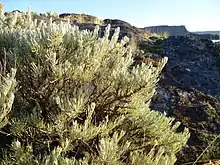Artemisia rigida
Artemisia rigida is a species of flowering plant in the aster family known by the common names scabland sagebrush[2] and stiff sagebrush. It is native to the northwestern United States, in Washington, Idaho, and Oregon.[3] It has been recorded in western Montana but these sightings may have been misidentifications.[4]
| Artemisia rigida | |
|---|---|
 | |
| Artemisia rigida at Banks Lake, Grant County Washington | |
| Scientific classification | |
| Kingdom: | Plantae |
| Clade: | Tracheophytes |
| Clade: | Angiosperms |
| Clade: | Eudicots |
| Clade: | Asterids |
| Order: | Asterales |
| Family: | Asteraceae |
| Genus: | Artemisia |
| Species: | A. rigida |
| Binomial name | |
| Artemisia rigida | |
| Synonyms[1] | |
| |
Artemisia rigida is a small, spreading, deciduous shrub with many woody branches up to 40 centimeters long. The stems are gray and hairy.[2] The leaves are up to 4 centimeters long and trident-shaped. They are grayish in color from their coat of silvery hairs. The plant is "mildly"[2] to "pungently"[5] scented. The flower heads are somewhat bell-shaped and measure about half a centimeter wide. They contain 4 to 8 yellow-red to red florets.[2]
Artemisia rigida grows in harsh substrates where few other plants survive. The soil is generally very shallow and covers bedrock. The bedrock is always basalt, never granite.[6] The roots of the plant are within the shallow soil layer with some anchoring in rock fractures. There is also sometimes a layer of impermeable clay. The substrate commonly undergoes frost heaving, which breaks it up. On these unproductive sites, which occur in the Channeled Scablands, for example, this plant is a climax species. It is an indicator of scabland habitat.[4] In the Columbia Basin it may dominate regions with thin soils, and have Sandberg's bluegrass as the main understory species.[7]
Artemisia rigida provides food for wildlife because it is often the only plant exposed as the snow melts in the spring on mostly barren landscapes. Livestock also like it, especially the seedheads.[4]
References
- The Plant List Artemisia rigida (Nutt.) A.Gray
- Artemisia rigida. Flora of North America.
- Biota of North America Program 2014 county distribution map
- McWilliams, Jack. 2003. Artemisia rigida. In: Fire Effects Information System, [Online]. U.S. Department of Agriculture, Forest Service, Rocky Mountain Research Station, Fire Sciences Laboratory.
- Artemisia rigida. USDA FS International Institute of Tropical Forestry.
- Daubenmire, R. (1982). The distribution of Artemisia rigidia in Washington: A challenge to ecology and geology. Archived June 7, 2012, at the Wayback Machine Northwest Science 56(3) 162.
- Native Grasslands and Shrub-steppe. Archived November 16, 2011, at the Wayback Machine USFWS Hanford Reach National Monument.
